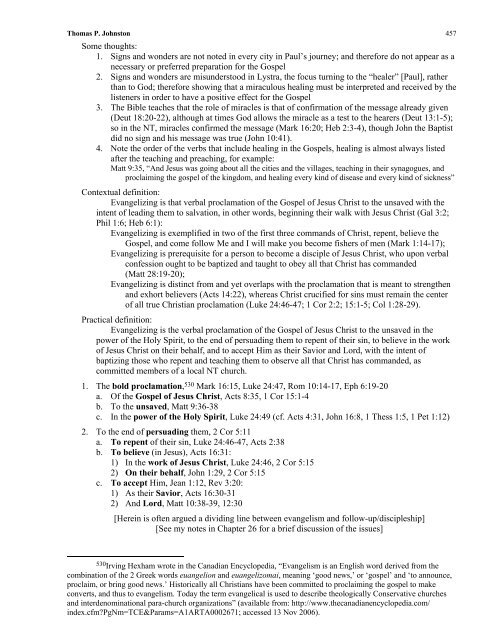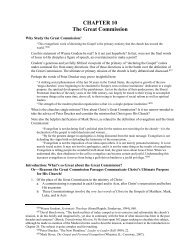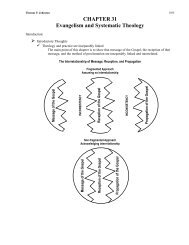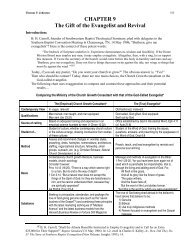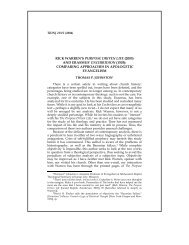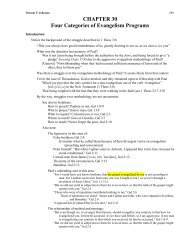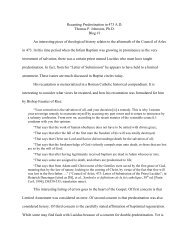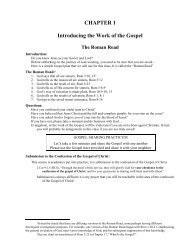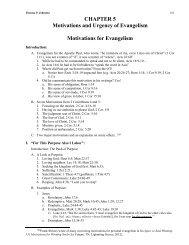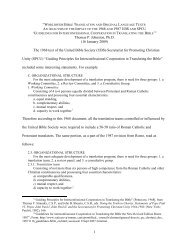CHAPTER 7 Defining Evangelizing - Evangelism Unlimited
CHAPTER 7 Defining Evangelizing - Evangelism Unlimited
CHAPTER 7 Defining Evangelizing - Evangelism Unlimited
Create successful ePaper yourself
Turn your PDF publications into a flip-book with our unique Google optimized e-Paper software.
Thomas P. Johnston 457<br />
Some thoughts:<br />
1. Signs and wonders are not noted in every city in Paul’s journey; and therefore do not appear as a<br />
necessary or preferred preparation for the Gospel<br />
2. Signs and wonders are misunderstood in Lystra, the focus turning to the “healer” [Paul], rather<br />
than to God; therefore showing that a miraculous healing must be interpreted and received by the<br />
listeners in order to have a positive effect for the Gospel<br />
3. The Bible teaches that the role of miracles is that of confirmation of the message already given<br />
(Deut 18:20-22), although at times God allows the miracle as a test to the hearers (Deut 13:1-5);<br />
so in the NT, miracles confirmed the message (Mark 16:20; Heb 2:3-4), though John the Baptist<br />
did no sign and his message was true (John 10:41).<br />
4. Note the order of the verbs that include healing in the Gospels, healing is almost always listed<br />
after the teaching and preaching, for example:<br />
Matt 9:35, “And Jesus was going about all the cities and the villages, teaching in their synagogues, and<br />
proclaiming the gospel of the kingdom, and healing every kind of disease and every kind of sickness”<br />
Contextual definition:<br />
<strong>Evangelizing</strong> is that verbal proclamation of the Gospel of Jesus Christ to the unsaved with the<br />
intent of leading them to salvation, in other words, beginning their walk with Jesus Christ (Gal 3:2;<br />
Phil 1:6; Heb 6:1):<br />
<strong>Evangelizing</strong> is exemplified in two of the first three commands of Christ, repent, believe the<br />
Gospel, and come follow Me and I will make you become fishers of men (Mark 1:14-17);<br />
<strong>Evangelizing</strong> is prerequisite for a person to become a disciple of Jesus Christ, who upon verbal<br />
confession ought to be baptized and taught to obey all that Christ has commanded<br />
(Matt 28:19-20);<br />
<strong>Evangelizing</strong> is distinct from and yet overlaps with the proclamation that is meant to strengthen<br />
and exhort believers (Acts 14:22), whereas Christ crucified for sins must remain the center<br />
of all true Christian proclamation (Luke 24:46-47; 1 Cor 2:2; 15:1-5; Col 1:28-29).<br />
Practical definition:<br />
<strong>Evangelizing</strong> is the verbal proclamation of the Gospel of Jesus Christ to the unsaved in the<br />
power of the Holy Spirit, to the end of persuading them to repent of their sin, to believe in the work<br />
of Jesus Christ on their behalf, and to accept Him as their Savior and Lord, with the intent of<br />
baptizing those who repent and teaching them to observe all that Christ has commanded, as<br />
committed members of a local NT church.<br />
1. The bold proclamation, 530 Mark 16:15, Luke 24:47, Rom 10:14-17, Eph 6:19-20<br />
a. Of the Gospel of Jesus Christ, Acts 8:35, 1 Cor 15:1-4<br />
b. To the unsaved, Matt 9:36-38<br />
c. In the power of the Holy Spirit, Luke 24:49 (cf. Acts 4:31, John 16:8, 1 Thess 1:5, 1 Pet 1:12)<br />
2. To the end of persuading them, 2 Cor 5:11<br />
a. To repent of their sin, Luke 24:46-47, Acts 2:38<br />
b. To believe (in Jesus), Acts 16:31:<br />
1) In the work of Jesus Christ, Luke 24:46, 2 Cor 5:15<br />
2) On their behalf, John 1:29, 2 Cor 5:15<br />
c. To accept Him, Jean 1:12, Rev 3:20:<br />
1) As their Savior, Acts 16:30-31<br />
2) And Lord, Matt 10:38-39, 12:30<br />
[Herein is often argued a dividing line between evangelism and follow-up/discipleship]<br />
[See my notes in Chapter 26 for a brief discussion of the issues]<br />
530 Irving Hexham wrote in the Canadian Encyclopedia, “<strong>Evangelism</strong> is an English word derived from the<br />
combination of the 2 Greek words euangelion and euangelizomai, meaning ‘good news,’ or ‘gospel’ and ‘to announce,<br />
proclaim, or bring good news.’ Historically all Christians have been committed to proclaiming the gospel to make<br />
converts, and thus to evangelism. Today the term evangelical is used to describe theologically Conservative churches<br />
and interdenominational para-church organizations” (available from: http://www.thecanadianencyclopedia.com/<br />
index.cfm?PgNm=TCE&Params=A1ARTA0002671; accessed 13 Nov 2006).


